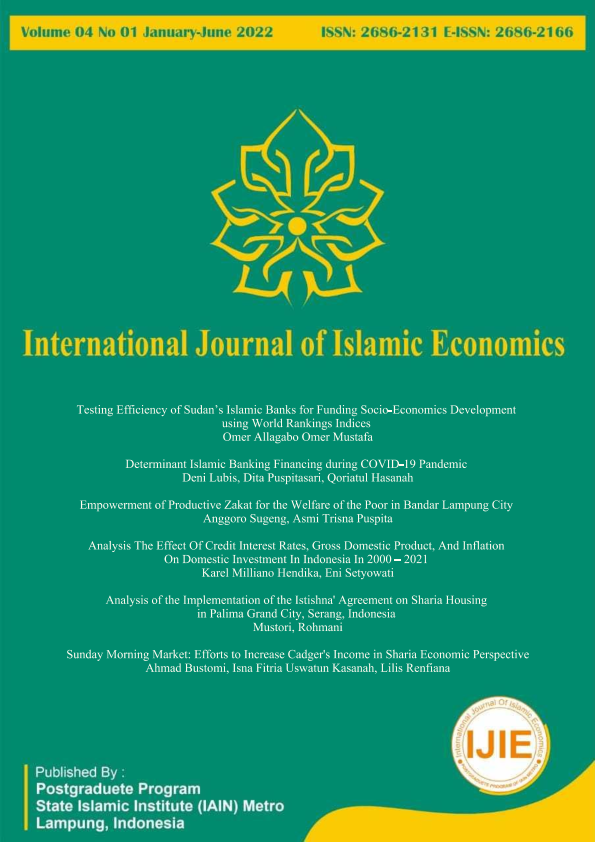Determinant Islamic Banking Financing during COVID-19 Pandemic
DOI:
https://doi.org/10.32332/ijie.v4i01.4751Keywords:
COVID-19, financial performance, Islamic banking financing, macroeconomics, panel dataAbstract
The spread of COVID-19 is becoming one of the biggest threats to the global economy and financial markets in the world. This study is conducted to determine the effect of the factors that influence profit-sharing financing during the COVID-19 pandemic on Islamic banking in Indonesia. This study uses a sample of 13 Islamic Commercial Banks and 20 Sharia Business Units and the time period is quarter I-IV 2020. The analytical tool used in this study is panel data regression with the Random Effect Model (REM) approach. The results indicate that DPK, NPF, FDR, ROA, GDP, inflation and the money supply simultaneously has an effect on profit sharing financing. For the partial estimation results, the variables of DPK, FDR, and ROA have a significant and positive effect on profit sharing financing. While the variables of NPF, GDP, inflation, and the money supply have no significant effect on profit sharing financing.
Downloads
References
Abduh M, Chowdhury NT. 2012. Does Islamic Banking Matter for Economic Growth in Bangladesh. Journal of Islamic Economics, Banking and Finance. 8(3): 104-113.
Abusharbeh M. 2020. Determinants of Islamic bank financing in the Middle East: Vector Error Correction Model (VECM). Investment Management and Financial Innovations. 17(4): 285-298.
Al-Fawwaz TM, Alawnehn AM, Shawaqfeh GN. 2015. The Impact of Islamic Finance on Some Macro Economic Variables (A case study of Jordan Islamic Bank. Interdisciplinary Journal of Contemporary Research In Business. 7(1): 10-30
Alqahtani F, Mayes DG. 2018. Financial stability of Islamic banking and the global financial crisis: Evidence from the Gulf Cooperation Council. Economic Systems. 42(2): 346–360
Alsa A. 2001. Kontroversi Uji Asumsi dalam Statistik Parametrik. Buletin Psikologi. 1(1): 20-21
Ascarya, Yuminata D. 2013. Bank Syariah: Gambaran Umum. Jakarta (ID): Pusat Pendidikan dan Studi Kebanksentralan.
[BI] Bank Indonesia. 2008. Undang-Undang Republik Indonesia Nomor 21 Tahun 2008. [internet]. [diunduh: 2020 September 20]. Tersedia pada:http://www.bi.go.id
[BI] Bank Indonesia. 1998. Undang-Undang Republik Indonesia Nomor 1 Tahun 1998. [internet]. [diunduh: 2020 September 15]. Tersedia pada:http://www.bi.go.id
[BPS] Badan Pusat Statistik. 2020. Pertumbuhan Ekonomi Indonesia Triwulan III-2020. [internet]. [diunduh: 2021 Januari 24]. Tersedia pada: http://www.bps.go.id
Bilgin MH, Danisman GO, Demir E, Tarazi A. 2020. Bank Credit in Uncertain Times: Islamic vs. Conventional Banks. Finance Research Letters. 1(1): 1-14.
Biorn E. 2017. Econometrics of Panel Data Methods and Applications. New York (US): Oxford University Press.
Chapra, M. U. (2011). The Global Financial Crisis: Can Islamic Finance Help. Islamic Economics and Finance. 1(2): 135–142.
Cucinelli D. 2015. The Impact of Non-performing Loans on Bank Lending Behavior: Evidence from the Italian Banking Sector. Eurasian Journal of Business and Economics. 8(16): 59-71.
Danupranata G. 2013. Buku Ajar Manajemen Perbankan Syariah. Jakarta (ID): Salemba Empat.
Farhani YG, Dastan M. 2013. Analysis of Islamic Banks’ Financing and Economic Growth: A Panel Cointegration Approach. International Journal Of Islamic And Middle Eastern Finance And Management. 6(2): 156-172.
Firdaus M. 2011. Aplikasi Ekonometrika untuk Data Panel dan Time Series. Bogor (ID): IPB Press.
Ghozali, Imam. 2016. Aplikasi Analisis Multivariete dengan Program IBM SPSS 23. Semarang (ID): Universitas Diponegoro.
Giannini. 2013. Faktor yang Memengaruhi Pembiayaan Mudharabah pada Bank Umum Syariah di Indonesia. Accounting Analysis Journal. 1(2013): 96-103.
Gujarati DN, Porter DC. 2009. Dasar-dasar Ekonometrika. Jakarta (ID): Salemba Empat.
Hasan M, Dridi J. 2011. The Effects Of The Global Crisis on Islamic and Conventional Banks: A Comparative Study. Journal Of International Commerce, Economics And Policy. 2(2): 163–200.
Hussain M, Shahmoradi A, Turk R. 2016. An Overview of Islamic Finance Journal of International Commerce, Economics and Policy. 7(1): 1-28.
Huda N, Idris HR, Nasution ME, Wiliasih R. 2008. Ekonomi Makro Islam Pendekatan Teoretis. Jakarta (ID): Kencana Pranada Media Group.
Imran K, Nishat M. 2013. Determinants of bank credit in Pakistan: A supply side approach. Economic Modelling. 35(2013): 384–390.
Jumingan. 2006. Analisis Laporan Keuangan. Jakarta (ID): PT. Bumi Aksara.
Karim, Adiwarman A. 2008. Bank Islam: Analisis Fiqih dan Keuangan Edisi 3. Jakarta: PT Raja Grafindo Persada.
Kasmir. 2012. Bank dan Lembaga Keuangan Lainnya. Jakarta (ID): PT Raja Grafindo Persada.
Keeton, WR. 1999. Does faster loan growth lead to higher loan losses. Economic review-Federal reserve bank of Kansas City. 1(1): 57-75.
Khan MS, Mirakhor A. 1989. The Financial System and Monetary Policy in anIslamic Economy. Journal of King Abdulaziz University: Islamic Economics. 1(1): 39-57.
[Kemenkes] Kementrian Kesehatan. 2020. Pedoman Kesiapsiagaan Menghadapi Coronavirus Disesase (COVID-19). [internet]. [diunduh: 2020 Februari 4]. Tersedia pada: http://www.kemenkes.go.id/
Mankiw NG. 2009. Macroeconomics. New York(US): Worth Publisher.
Muhammad. 2005. Manajemen Bank Syariah. Yogyakarta (ID): UPP AMP YKPN.
Nasution D, Erlina, dan Muda I. 2020. Dampak Pandemi COVID-19 terhadap Perekonomian Indonesia. Jurnal Benefita. 5(2) : 212-224.
Nastiti ND, Kasri RA. 2019. The role of banking regulation in the development of Islamic banking financing in Indonesia. International Journal of Islamic and Middle Eastern Finance and Management. 12(5) : 643-661.
Nicola M, Alsafib Z, Sohrabic C, Kerwand A, Al-Jabird A, Iosifidisc C, Aghae M, Agha R. 2020. The socio-economic implications of the coronavirus pandemic (COVID-19): A review. International Journal of Surgery. 78(2020): 185-193.
[OJK] Otoritas Jasa Keuangan. 2020. Statistik Perbankan Syariah Desember 2020. Departemen Perizinan dan Informasi Perbankan [internet]. [diacu 2021 Februari 28]. Tersedia dari: http://www.ojk.go.id.
Rabab’ah M. 2015. Factors affecting the bank credit: an empirical study on the Jordanian commercial banks Association of Banks in Jordan. International Journal of Economics and Finance. 7(5): 166-178.
Smolo E, Mirakhor A. 2010. The global financial crisis and its implications for the Islamic financial industry. International Journal of Islamic and Middle Eastern Finance and Management. 3(4): 372–385.
Solikin, Suseno. 2002. Uang Pengertian, Penciptaan, dan Peranannya dalam Perekonomian. Jakarta (ID): Bank Indonesia.
Tabash MI, Dhankar RS. 2014. The Impact of Global Financial Crisis on the Stability of Islamic Banks: An Empirical Evidence. Journal of Islamic Banking and Finance. 2(1): 367-388.
Wardiantika L, Kusumaningtias R. 2014. Pengaruh DPK, CAR, NPF, dan SWBI Terhadap Pembiayaan Murabahah Pada Bank Umum Syariah Tahun 2008-2012. Jurnal Ilmu Manajemen. 2(4): 1550-1561.








